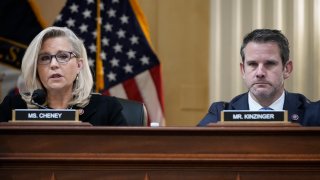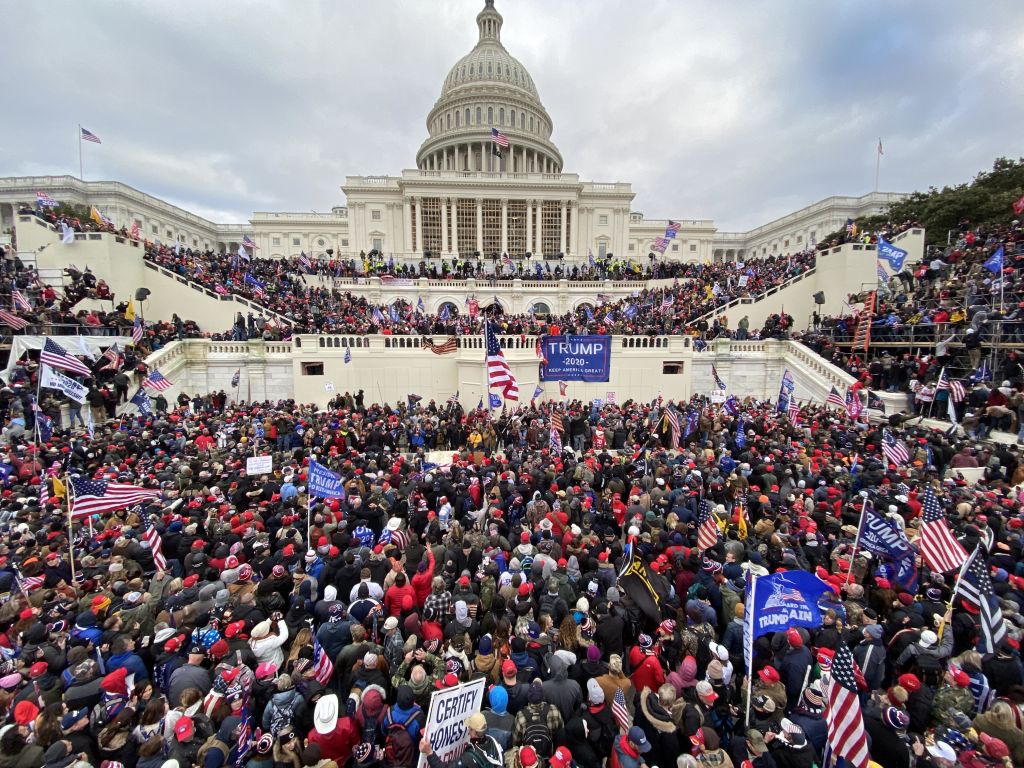
The Republican National Committee censured two GOP lawmakers on Friday for participating on the committee investigating the violent Jan. 6 insurrection and assailed the panel for leading a “persecution of ordinary citizens engaged in legitimate political discourse.”
GOP officials took a voice vote to approve censuring Reps. Liz Cheney of Wyoming and Adam Kinzinger of Illinois at the party's winter meeting in Salt Lake City. The censure was approved a day after an RNC subcommittee watered down a resolution that had recommended expelling the pair from the party.
The censure accuses Cheney and Kinzinger of “participating in a Democrat-led persecution."
RNC Chair Ronna McDaniel denied that the “legitimate political discourse” wording in the censure was referring to the violent attack on the Capitol by supporters of then-President Donald Trump and said it had to do with other actions taken by the House committee investigating the Jan. 6, 2021, insurrection. But the resolution drew no such distinction.
Get top local stories in Southern California delivered to you every morning. >Sign up for NBC LA's News Headlines newsletter.
RNC members take issue with what they see as the overly broad subpoenas, including one for Arizona GOP Chair Kelli Ward. Ward, an osteopathic doctor, sued to block the subpoena and argues that providing her phone records would compromise patients’ privacy.
“What are you going for? What are you looking for? You should have a specific scope,” said Pam Pollard, an RNC member from Oklahoma.
But GOP Sen. Mitt Romney of Utah, who voted to convict Trump in both of his impeachment trials, excoriated his party for the censure.
U.S. & World
News from around the country and around the globe
“Shame falls on a party that would censure persons of conscience, who seek truth in the face of vitriol,” he tweeted. “Honor attaches to Liz Cheney and Adam Kinzinger for seeking truth even when doing so comes at great personal cost.”
McDaniel is his niece.
As Republicans in Salt Lake City tied the party even more tightly to Trump, his former vice president, Mike Pence, rebuked him. Speaking to the conservative Federalist Society in Florida, Pence said Trump was “wrong” to suggest he could have overturned the election.
“I had no right to overturn the election," he said, also noting that Jan. 6 was “a dark day in the history of the United States Capitol.”
McDaniel and her co-chair Tommy Hicks focused their remarks to RNC members on the 2022 midterms and key tenets of their platform — crime rates, parental rights over school curriculum choices and pandemic restrictions on businesses. Though they hardly mentioned the former president by name, Trump's sway among party officials was made evident by the censure and criticisms of the Commission on Presidential Debates.
Cheney, of Wyoming, and Kinzinger, of Illinois, are the only two Republicans on the House committee investigating the attack on the Capitol. Trump and other GOP members were incensed when Kinzinger and Cheney agreed to House Speaker Nancy Pelosi’s invitation to join the Democratic-led House committee, giving the Jan. 6 panel a veneer of bipartisan credibility.
The most consequential element of the censure is a call for the party to no longer support Cheney and Kinzinger as Republicans.
The censure — combined with support from RNC members from Wyoming — allows the party to invoke a rule to back candidates other than Cheney. It sets in motion a way for the party to support Cheney's primary opponent, Harriet Hageman, who has been endorsed by Trump. Wyoming's primary is in August.
Cheney spokesman Jeremy Adler said in a statement that the move subverted the will of Wyoming voters.
“Frank Eathorne and the Republican National Committee are trying to assert their will and take away the voice of the people of Wyoming before a single vote has even been cast," he said, referring to the Wyoming GOP chair who co-sponsored the resolution.
Kinzinger is not running for reelection.
RNC members also voted in favor of a rule change that would prohibit their candidates from participating in debates organized by the Commission on Presidential Debates.
The institution has been a staple of presidential elections for three decades, but Republicans have decried the format as biased. After advancing on Friday, the rules change is expected to be completed when the RNC meets in summer.
Republicans object to past moderators they perceive as left-leaning and remarks about Trump made by commission co-chair Mike McCurry.
“Restoring faith in our elections means making sure our candidate can compete on a level playing field,” McDaniel said in a speech on Friday.
“We are not walking away from debates, we are walking away from the Commission on Presidential Debates because it’s a biased monopoly that does not serve the best interests of the American people," she added.
Even with a rules change, decisions about whether to participate in commission-sponsored debates will fall to the GOP’s eventual 2024 nominee.



